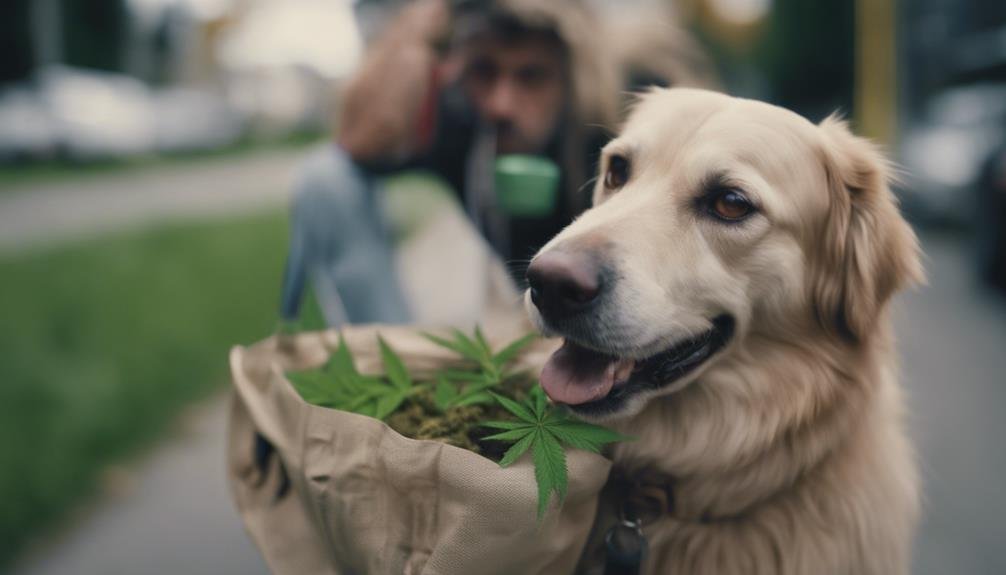When faced with the unsettling scenario of a dog consuming marijuana, pet owners must swiftly navigate the complexities of mitigating potential harm to their beloved companions.
The repercussions of such ingestion can range from mild to severe, necessitating a well-informed and proactive response. Understanding the gravity of the situation and knowing the appropriate steps to take is paramount in safeguarding the health and well-being of the affected pet.
As we delve into the intricacies of managing this delicate situation, a comprehensive approach to addressing marijuana toxicity in dogs is essential for ensuring optimal outcomes and swift recovery for our furry friends.
Key Takeaways
- Seek immediate veterinary care for your dog if they ingest marijuana.
- Decontaminate with activated charcoal and treat neurological effects promptly.
- Prevent future incidents by storing marijuana products securely and educating family members.
- Monitor symptoms closely and follow the vet's guidance for proper treatment.
Understanding Marijuana Toxicity in Dogs
The understanding of marijuana toxicity in dogs is essential for pet owners to recognize the potential dangers and symptoms associated with cannabis ingestion by their canine companions. Cannabis contains cannabinoids that affect the central nervous system, with THC being the primary mind-altering compound in marijuana.
Symptoms of marijuana ingestion in dogs may include uncoordinated gait, hyperactivity, dilated pupils, vomiting, seizures, coma, and even death. Elevated body temperature resulting from ingestion can lead to brain damage. It is crucial for pet owners to be aware that concentrated marijuana products pose higher risks to pets, and immediate veterinary care should be sought if ingestion occurs.
Educating oneself about the effects and toxicity of marijuana in dogs can help in taking prompt and appropriate actions to ensure the well-being of the pet.
Recognizing Symptoms of Marijuana Ingestion
Symptoms indicative of marijuana ingestion in dogs can manifest as a range of neurological and physical abnormalities. These symptoms may include:
- Uncoordinated gait and movement
- Hyperactivity or lethargy
- Dilated pupils
- Disorientation or confusion
It is essential for dog owners to be vigilant for these signs, especially if they suspect their pet has consumed marijuana. Recognizing these symptoms promptly can aid in seeking appropriate veterinary care and mitigating any potential risks associated with marijuana toxicity.
Understanding the common indicators of marijuana ingestion in dogs is crucial for ensuring the well-being and safety of our furry companions.
Immediate Actions to Take After Ingestion

Recognizing the signs of marijuana ingestion in dogs is crucial in promptly initiating appropriate actions to address the situation. If your dog has consumed marijuana, the first step is to seek immediate veterinary care. Time is of the essence in these situations to prevent any potential complications.
Decontamination techniques, such as using activated charcoal to absorb the drug, may be recommended by the veterinarian. Treatment for any neurological effects may involve the administration of specific drugs and tranquilizers. Cooling down the dog and providing sedation might also be necessary to manage symptoms effectively.
It is essential to closely monitor your dog's condition and follow the vet's guidance for any further necessary treatment.
Decontamination Techniques for Marijuana Consumption
In cases of marijuana ingestion in dogs, prompt decontamination through the use of activated charcoal is a vital step in mitigating potential toxicity risks. Activated charcoal works by binding to the toxins in the stomach, preventing further absorption into the bloodstream.
To effectively decontaminate a dog that has ingested marijuana, follow these key steps:
- Administer activated charcoal orally as soon as possible.
- Consult with a veterinarian to determine the appropriate dosage based on the dog's weight.
- Monitor the dog for any signs of improvement or worsening symptoms post-administration.
- Be prepared for potential side effects such as vomiting or black stools, which are common but temporary.
Medications and Treatments for Marijuana Toxicity

Effective treatment of marijuana toxicity in dogs typically involves a combination of medications and supportive care under veterinary supervision.
Medications such as intravenous fluids are administered to help flush out the toxins and maintain hydration levels. Antiemetics may be given to control vomiting, while medications like activated charcoal can aid in binding the remaining toxins in the stomach.
In cases of severe symptoms such as seizures or tremors, sedatives or tranquilizers may be used to manage neurological effects. Close monitoring of the dog's vital signs and overall condition is essential throughout the treatment process.
Veterinary professionals will tailor the treatment plan to the individual dog's symptoms and needs to ensure the best possible outcome.
Managing Neurological Effects in Dogs
Addressing the neurological repercussions of marijuana ingestion in dogs necessitates prompt and vigilant management to mitigate potential risks and ensure the well-being of the animal.
When managing neurological effects in dogs after marijuana ingestion, consider the following:
- Observation: Monitor the dog closely for symptoms such as disorientation, tremors, and seizures.
- Medication: Administer medications prescribed by a veterinarian to control seizures or other neurological issues.
- Supportive Care: Provide a comfortable and quiet environment to help the dog recover from the neurological effects.
- Consultation: Seek guidance from a veterinary professional for tailored care and ongoing monitoring of the dog's neurological condition.
Cooling Measures and Sedation for Pets

Implementing proper cooling measures and administering sedation are crucial steps in managing pets experiencing marijuana toxicity. Pets may exhibit symptoms such as elevated body temperature, agitation, and potentially seizures due to marijuana ingestion.
To help cool down the animal, provide a cool environment with access to fresh water and avoid wrapping them in blankets. Sedatives prescribed by a veterinarian can help calm the pet and reduce anxiety levels.
It is important to consult with a professional to determine the appropriate sedation dosage based on the pet's size and condition. These measures can aid in alleviating the distressing effects of marijuana toxicity and promote the animal's well-being while awaiting veterinary care.
Monitoring and Follow-Up Care
In cases of marijuana toxicity in pets, monitoring their condition closely and providing appropriate follow-up care is essential for ensuring their recovery and well-being. After the initial treatment for marijuana ingestion, ongoing observation and care are crucial. Here are some key steps to consider during the follow-up period:
- Regularly assess the pet's vital signs and behavior to track any changes or improvements.
- Follow the veterinarian's instructions regarding any medications or further treatments needed.
- Provide a comfortable and quiet environment for the pet to recover peacefully.
- Contact the vet immediately if any new or concerning symptoms develop.
Preventing Future Marijuana Ingestion Incidents

To minimize the risk of future incidents of marijuana ingestion in dogs, responsible pet owners must take proactive measures to secure and restrict access to cannabis products. This can be achieved by storing marijuana edibles and products in child-proof containers placed on high shelves out of reach of pets.
Educating family members about the symptoms of cannabis ingestion in dogs can also help in preventing accidental exposure. Training commands like 'leave it' or 'drop it' during walks can further reinforce boundaries.
Vigilance during outdoor activities is crucial to prevent dogs from consuming discarded marijuana materials. By implementing these preventive measures, pet owners can reduce the likelihood of their dogs encountering and ingesting marijuana.
Statistics and Trends in Marijuana Ingestion
The rising incidence of marijuana ingestion cases in dogs reflects a concerning trend in pet-related toxicities. As more states legalize marijuana, the number of reported incidents involving dogs consuming cannabis products has been on the rise. Some key statistics and trends include:
- ASPCA reported a 173% increase in marijuana ingestion cases since 2017.
- The legalization of marijuana in more states may lead to a rise in pet-related cases.
- Dogs are attracted to various forms of marijuana, including edibles.
- Concentrated marijuana products pose higher risks to pets.
These figures highlight the importance of awareness, prevention, and immediate veterinary intervention in cases of marijuana ingestion in dogs.
Conclusion
In conclusion, understanding the potential consequences of marijuana ingestion by dogs is crucial in ensuring the well-being of pets.
Prompt recognition of symptoms, immediate action, decontamination techniques, and appropriate medical treatments are essential in mitigating harm.
By being proactive in preventing future ingestion incidents, pet owners can safeguard their canine companions from the harmful effects of marijuana consumption.
It is imperative to prioritize the safety and health of dogs in scenarios involving marijuana toxicity.




